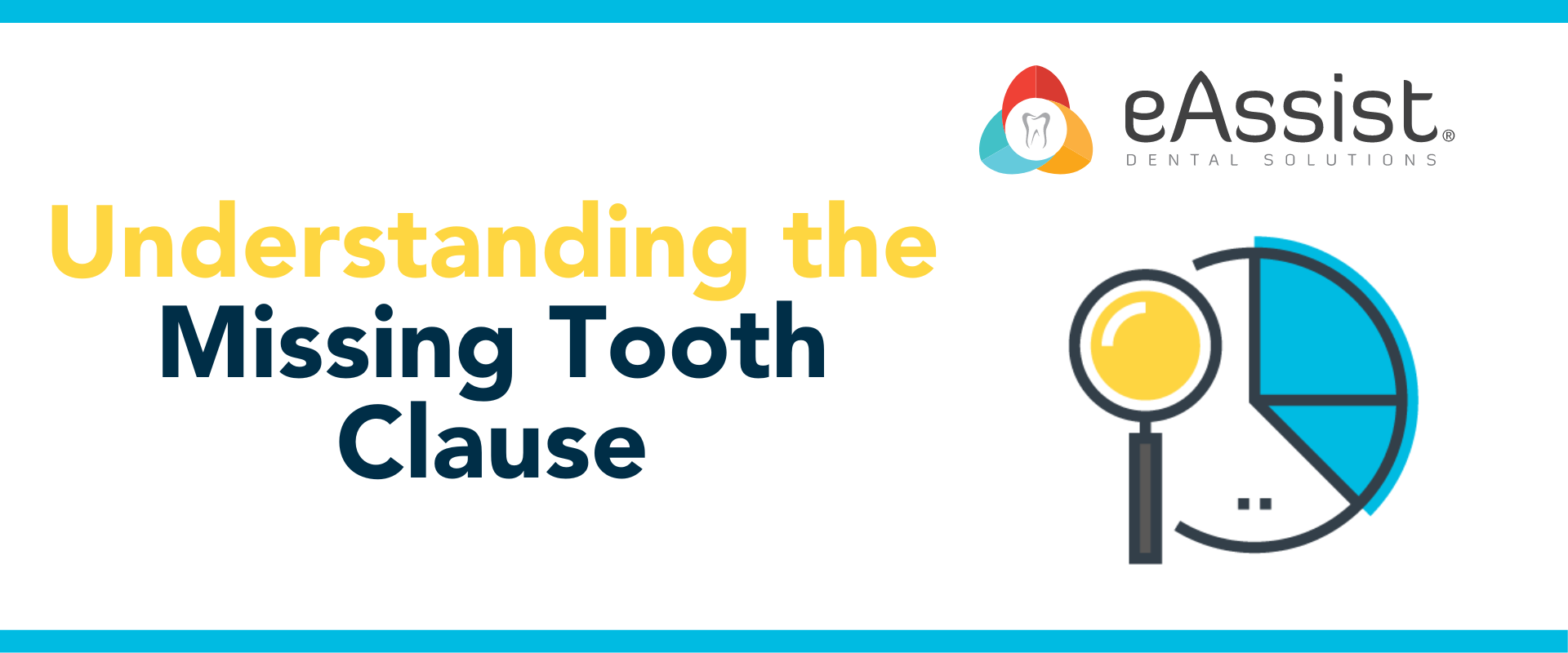Dental insurance plans are full of clauses and provisions, which can lead to confusion when billing a dental claim. There’s a lot to remember, whether it’s waiting periods, alternative benefit downgrades, or missing tooth clauses. Speaking of missing tooth clauses, what are they? In the following, we’ll provide insight into just how they work.
What is a missing tooth clause?
It is a dental insurance stipulation in which any prosthesis replacing a tooth that has been extracted before the plan’s effective date will not be covered.
Clarifying a missing tooth clause
What treatment is affected by the missing tooth clause?
Any prosthesis that replaces a missing tooth can be affected by it. This includes fixed partials/bridges, removable partials, implants, and dentures.
How do I know if my patient’s plan has a missing tooth clause?
When verifying insurance coverage, always ask if the plan has it, especially if any prosthetic treatment is planned.
Applying a missing tooth clause
Does a missing tooth clause apply to a replacement prosthesis?
No. There are always exceptions, but most insurance carriers only apply it to the initial placement of a prosthesis. Keep in mind that though it doesn’t apply, replacement prostheses are subject to frequency limits.
My patient’s tooth is congenitally missing. Does a missing tooth clause apply?
Yes. It applies to any tooth that is missing prior to the current plan’s effective date, regardless of whether it has been removed or has been missing since birth.
We are scheduling a full denture for a patient. We are completing most of the extractions, but a few teeth were previously removed. Would a missing tooth clause apply?
It depends on when the previous extractions were completed. If those teeth were extracted before the current plan’s effective date, it does apply. When a prosthesis is replacing multiple teeth, only one of those teeth needs to meet the criteria for a missing tooth clause for the insurance to deny the entire prosthesis.
Billing a missing tooth clause
My patient’s plan has a missing tooth clause and we will complete an implant. What do I do?
When you come across it when planning treatment, always double-check two things – the current plan’s effective date and the date the tooth was extracted. If the extraction was completed after the plan started, you can proceed as normal. If it was completed prior to the plan’s effective date, it applies and you will not be receiving any insurance payment. Make sure the patient is aware of this before treatment so they won’t receive an unexpected bill.
My patient’s plan has a missing tooth clause and we will complete a partial denture. The patient does not remember when the tooth was extracted. What should I do?
It’s very important to know the date of the extraction, especially if there’s a chance it was completed prior to the current plan’s effective date. Ask the patient to review their records to see if they can find it. You can also call their previous office to confirm the date. Always try to obtain it before billing. If you can’t confirm whether or not it applies, bill with caution. Keep in mind you may not get paid, and make sure the patient is aware so they won’t be surprised if they receive a bill.
My patient’s plan has a missing tooth clause but we will be completing the extraction. Do I need to be concerned?
If the extraction has not been completed yet, there’s no need to concern yourself with it. It only applies to teeth that have been missing or removed before the current plan’s effective date.

Appealing a missing tooth clause
I billed a partial denture and it was denied for a missing tooth clause. My patient did have insurance when the tooth was extracted, but it was with a different carrier. Can I appeal?
Usually, no. As a rule, when it applies, any tooth missing or extracted prior to the current plan’s effective date will not be covered. In other words, the patient must have had the same insurance carrier when the tooth was extracted. Certain plans do have special provisions allowing for coverage. If the patient can prove they had insurance coverage on the extraction date, even with a different carrier, they may still cover the partial. These are not the norm so it’s best to clarify plan-specific provisions when verifying insurance.
I billed a bridge that was denied for a missing tooth clause. I understand the pontic will not be covered but can I appeal for coverage of the abutments?
You can appeal. Some plans will consider the abutments individually when the missing tooth clause applies to the pontic. Some plans will reconsider with a supporting narrative while others may require a corrected claim. When appealing, double-check the plan’s requirements beforehand.
Missing tooth clauses can be confusing, but once understood, they won’t impede dental billing. If you are struggling with them or any other insurance provisions, consider outsourcing. At eAssist our Success Consultants are familiar with various insurance requirements and regulations and will correctly bill your claim each time. To learn more, complete the form below.









0 Comments